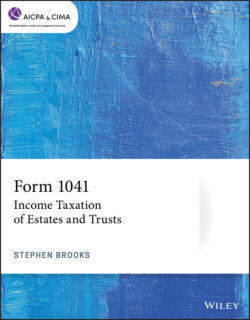Читать книгу Form 1041 - Stephen Brooks - Страница 36
На сайте Литреса книга снята с продажи.
Example 1-1
ОглавлениеMr. Wilson wishes to create a trust for the benefit of his grandson, Tim, age 18, to assist in funding Tim's education. Mr. Wilson has his lawyer draft a trust agreement consistent with this purpose. The terms of the trust as provided in the trust agreement state that Mr. Wilson's friend Steve is appointed trustee of the trust.
During the term of the trust, the $100,000 is to be invested by the trustee, and the trustee is to distribute trust income at least annually to Tim. The trustee may also distribute trust principal if needed to provide for Tim's “educational needs, as deemed appropriate by the trustee.” The trust is to terminate and the remaining trust balance is to be distributed outright and free of trust to Tim, upon Tim attaining his 21st birthday.
Upon execution of the trust document, Mr. Wilson transfers $100,000 to the trust by writing a check for $100,000 to “Mr. Steve, as trustee of the trust established for the benefit of Tim.” Mr. Steve establishes an investment account with ABC Bank, in the trust name, and deposits the check. A tax identification number is obtained on behalf of the trust. The $100,000 originally funding the trust makes up the original corpus or principal of the trust. Mr. Steve invests the $100,000 in a certificate of deposit paying 3 percent interest a year. The interest earned will be the income of the trust.
The trustee must make distributions to Tim as provided in the trust document — therefore income must be distributed on an annual basis, and principal if needed for the “education” of Tim. Each year, Steve distributes the interest income earned by investment of the trust principal. At age 20, Tim enrolls in college, and the trustee pays the first-year tuition from the principal of the trust. Steve is not permitted to distribute principal for any other purpose than as provided in the trust, until Tim reaches age 21, at which point the trust is to end and the remaining trust balance is to be distributed to Tim.
In addition, the trustee has a duty to keep adequate records of administration of the trust assets and to respond to requests for information related to the trust's administration. During the term of the trust, the trust is a taxpayer and Steve must file tax returns on behalf of the trust. The income earned by the trust must be reported on that tax return.
In addition, there will be costs incurred by the trust, such as the trustee's compensation and accounting fees. Similar to individual taxpayers, these costs may be deductible for tax purposes on the trust's tax return when determining the trust's taxable income.
